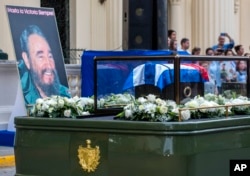Cuba marks the first anniversary of the death of revolutionary leader Fidel Castro on Saturday followed by municipal elections on Sunday that will usher in a new leader who for the first time in 60 years will not be a Castro brother.
The island will hold a series of remembrances from Saturday through Dec. 4, the day Castro was laid to rest in a cemetery in Santiago de Cuba, where he launched the Cuban revolution.
Fidel Castro's death last Nov. 25 ushered in a nine days of national mourning. The Cold War icon, who defied U.S. efforts to topple him, died at the age of 90.
By the time he died, Castro had been largely out of public view for nearly a decade because of ill health. He ceded the presidency to his younger brother, Raul Castro, in 2008 after intestinal troubles nearly killed him in 2006.
State-run media reports that galas and vigils will be held around the country this week in honor of Fidel Castro. State television is running archived footage of Fidel Castro, and cultural institutions are dedicating their performances to his memory.
Elections and gradual transition
During the weeklong events, citizens will also take part in municipal elections. The vote will end with the selection of a new president in late February, after Raul Castro said he would step down at the end of his two consecutive five-year terms.
The transition to new leadership, however, is expected to be gradual as Raul Castro will remain head of the Communist Party, the only legal party in Cuba.
State-run media is championing the belief that the elections are a way for citizens to show support for Fidel Castro's ideas. In the provincial and national votes, candidates were chosen by commissions made up of Communist Party representatives.
The elections come at difficult time for Cuba, as relations with the United States have worsened under U.S. President Donald Trump and its economy continues to suffer as the fortunes of its key ally Venezuela decline.







